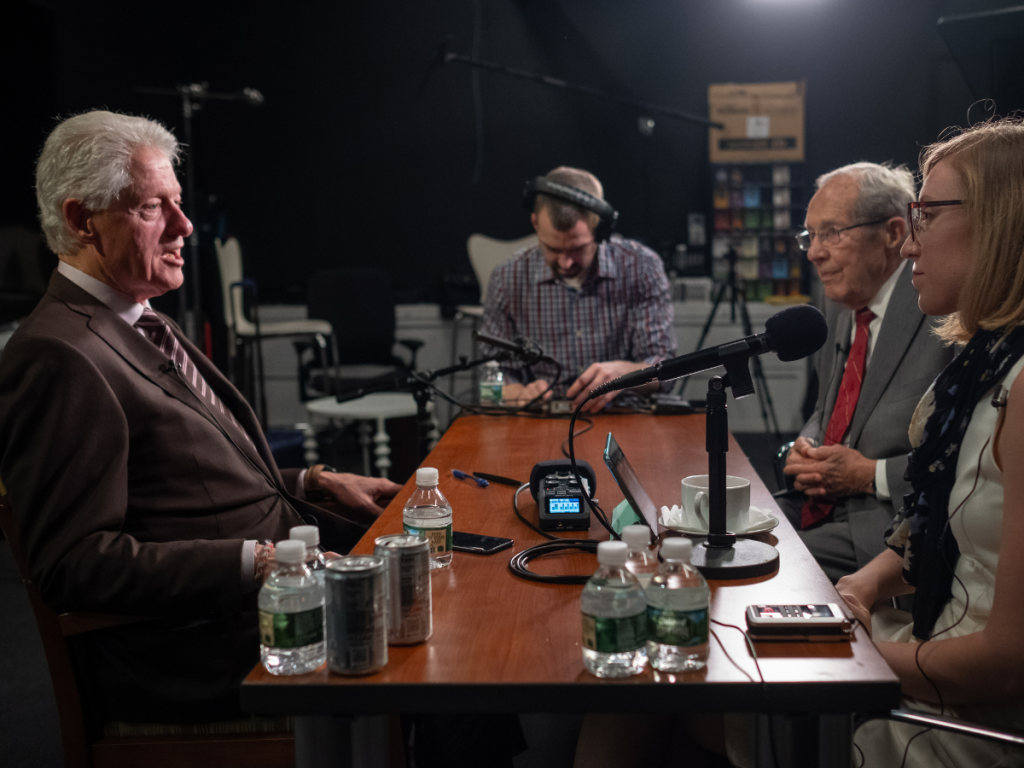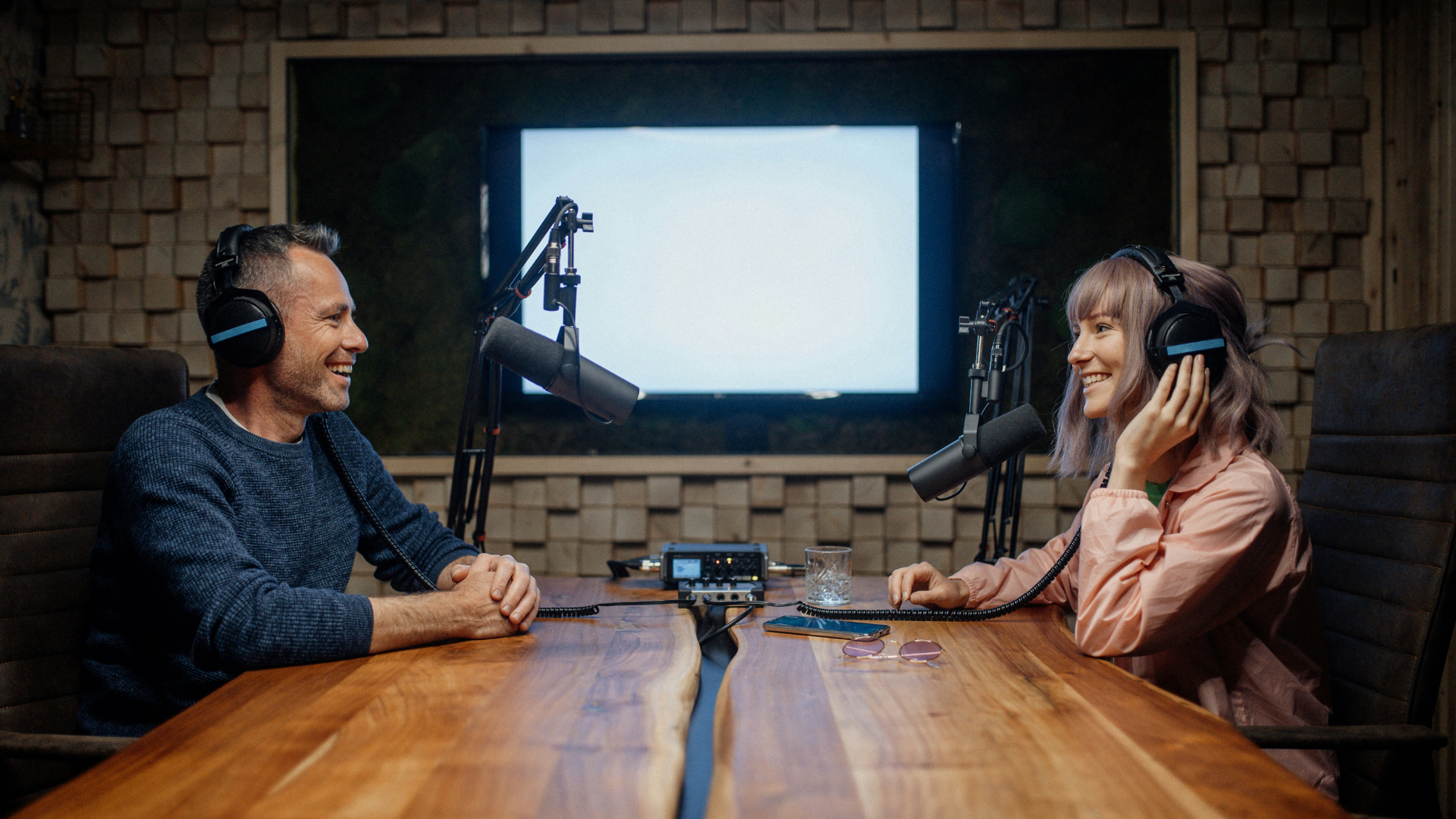23% of the top-rated podcasts have an interview format, according to Pew Research Center. I am sure this number would be higher if finding the perfect interview guests were easy. But it’s not.
Time is one of our most precious resources. If I messaged you on LinkedIn today, asking for an hour to “pick your brain”, you would most likely say no.
However, if I messaged you about a specific topic related to your career and offered you an opportunity to discuss it on my podcast, the chances of you saying yes would increase dramatically.
Interviewing the right guest can help grow your own authority, establish trust, build relationships with new people, and most importantly, increase the quality of your content for your listeners.
Unfortunately, most podcasters are unintentional at best and lazy at worst when it comes to booking guests. In fact, guest mismanagement is one of the most common pitfalls in the podcast planning process.
By the end of this article, you’ll understand the most common mistakes hosts make when looking for guests for their podcasts, and how to solve these mistakes with a simple 4-step process.
4 mistakes podcasters make when booking guests.
Booking the right guest for your company’s show isn’t difficult in theory, however, most podcast hosts fail because they don’t know what the best practices are or where to put their effort.
Mistake #1: You don’t have a plan.
Any company that’s producing and publishing a podcast should have a clear understanding of what they are creating on macro (across a podcast season/multiple episodes) and micro (individual episodes) levels. However, most modern interview show hosts don’t think more than 1 to 3 episodes ahead.
(P.S. Interviewing “successful” entrepreneurs about their businesses is not a plan.)
Mistake #2: Accepting every podcast pitch.
The number of people who want to be on a podcast far outweighs the number of podcast hosts actively searching for guests. This leads to an excess of poorly targeted podcast pitches and most podcast guests matching websites flooded with attention hogs.
The worst part is many podcasters blindly accept these requests, resulting in subpar, sales-pitchy interviews.
Mistake #3: Not knowing where to find the right guests.
Even when podcasters take the time to plan who they want to invite to their show, it’s difficult to source the right guest.
Most podcasters come up with templated scripts that they can copy and paste easily into a DM. Making blanket requests on social media isn’t effective and runs dry quickly.

Mistake #4: Not knowing how to pitch your show.
Let’s say you took the time to plan your episodes, and you found someone you want to invite on your show. Even with your research in place, it can be difficult to know how to contact specific people or what to say when you do (especially if they are high-profile).
You might decide to contact their assistant with your templated script and overwhelm them with all the information they could possibly need. If you’re feeling lucky, you might try to contact the person directly, only to get crickets in return.
This is what happens when you don’t have a proven process.
Before you hang up the headphones and call it quits, I have good news. We’ve been helping our clients identify, book, and interview hundreds of guests for their shows. I’ve also been doing this for my own shows for over 12 years. During this time, we developed a simple 4-step process to source the best guests.
And now I’m going to share it with you.
The 4-step process to finding the perfect podcast guest.
Step 1: Have a plan.
If you don’t have a plan, no amount of research will help you find the right guest.
The easiest place to start is understanding your end goal. Ask yourself the following questions:
- Why are you creating the podcast?
- Who is the target audience?
- What are they going to get out of listening to your show? After listening to a single episode? After listening to multiple episodes?
When you know where you’re going, it will be easier to understand the steps necessary to get you there.
For example, when we helped one of our clients plan and produce their show, At The Brink, the goal was incredibly clear. They wanted to create awareness around the impact of nuclear weapons, and the only way to establish authority and credibility was by talking to real experts. Such a clear goal led to interviews with nuclear engineers, national security advisors, and even the 42nd President of the United States, Bill Clinton.
Our client couldn’t just choose people at random or take any guest request that landed in their inbox. If they wanted credibility, they had to choose the right people, which leads to the next step.

Step 2: Choose the right person to tell the story.
Podcasters mess this step up because they don’t understand what they are looking for and, too often, they schedule the first option available.
Basically, there are two types of people you can book on your show:
- An individual
- A category
Let me explain.
Booking an individual means booking a specific person. If you were creating a show about being in the band Radiohead, you would need to interview a specific member of Radiohead. The story just won’t carry the same weight if it’s told by other bands, fans, or roadies.
Other times, you might need to interview one person out of a group. For example, if you were creating an episode about the culture of Radiohead concerts, you could interview any band member or anyone who frequented shows.
When you understand if you need an individual or a category, knowing where to look becomes much easier.
Bonus tip: Someone with direct experience is always better than someone with second-hand experience.
Step 3: Know where to find your interview guest and how to reach out.
Most podcasters limit themselves to their immediate network. That is only one-third of your possibilities.
Instead, you need to consider the following:
- The people you know: Your professional network, friends, family, acquaintances, etc.
- The people you haven’t met but are close to your network: People you might not know personally, or only met once, but with whom you have some connection. Friends of friends, industry peers, etc.
- The people you need to research and find: People you don’t know and don’t have their contact information.
Your job is easy if the right person for your interview is someone you know, but this is not usually the case. Regardless, I’m going to share tips on how to find and contact each of these three groups of people.
Reaching out to someone you know:
- Contact them in whatever way is easiest.
- Tell them what your podcast is about.
- Explain why you’d like to have them on.
- Ask if they would like to be a guest.
If they say yes, send them the details they need to schedule and be ready for the interview.
Reaching out to a stranger when you have their contact:
If this is a 2nd-degree connection, meaning someone you know could introduce you, try a two-step introduction, i.e., get permission to contact them.
- Don’t reach out to the potential guest directly. Give your mutual connection basic info about your podcast and ask them to contact the person to see if they are interested.
- If they are interested, have your mutual connection make an introduction or reach out directly. This is more respectful of the guest’s time and guarantees a response.
- If the guest says no, move on to someone new.
If you are reaching out to someone cold, find ways to warm them up first.
- Follow them on social media and meaningfully engage with their content.
- Read up on their background or career.
- Join their newsletter (if they have one).
- Get on the radar of people in their circle who might be more accessible (again, only if relevant).

Find the right guest through research:
If there is no one within your immediate or extended networks who could be a perfect guest, you will need to do some research. Consider the following mediums:
- Content creators
- Google search the “news” results for a niche topic or industry
- Advanced search features on social media
- Groups on social media
- YouTube topics and industries
- Recent news and magazine articles
- Connectively (previously called HARO)
- Networking and speakers at conferences
- Recommendations from other experts in similar fields
- Guests from other similar podcasts
- Guest booking services (use with caution)
Additionally, you can consider outsourcing the whole interview process.
Remember, you should choose the best person for the interview. Not the one who is easiest to contact. Once you have a list of potential guests, you will need to contact them and persuade them to be a guest on your podcast. Which leads us to the final step…
Step 4: What to say when reaching out.
I call this part of the process “easing into the ask.” It’s easy to jump straight into ALL the details of how and why to be on your show. Don’t. Especially if this is a cold outreach to someone who doesn’t know you.
Instead, break it into two emails:
- Email 1: Gauge their interest.
- Email 2: Provide the details.
In your first email, try to include the following:
- A specific trait, skill, or accomplishment that you know about the person, related to why you want them on your podcast.
- Brief context of who you are and what your podcast is about.
- The reason you would like to have them on as a guest.
- Ask if they are interested in being a guest.
If they say yes, send a follow-up email with the following:
- Thank the person.
- Describe the show, audience, and goal/intent.
- Give them interview details and explain how to schedule a time.
- Recommend any prep they should do (keep limited).
- Let them know how to preview the show in advance.
- Offer to answer any questions they have.
If they don’t respond, it’s okay to briefly follow up a few times. People are busy and don’t always respond right away.
If they say no, respect it and move on to the next best guest.

Wrapping up.
There is no shortage of people who want to be interviewed, and it’s tempting to accept whoever just to get the interview scheduled and the show running. However, if you want an excellent interview and a high-quality podcast, choosing the right guest is a huge part of the process.
Remember the four simple steps:
- Have a plan.
- Decide on the best people to interview.
- Know how to find them.
- Know how to reach out.
Follow these steps for quality guests and, ultimately, a better podcast.
If you are ready to create a podcast for your company, but don’t have the time to manage every step of the process perfectly, schedule a discovery call with us today.


